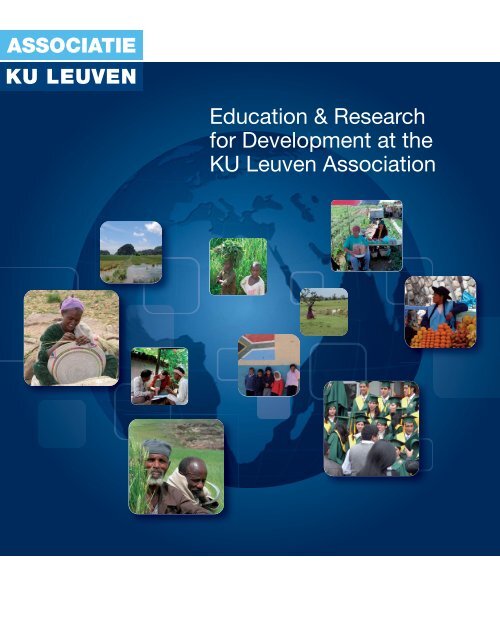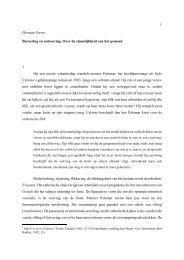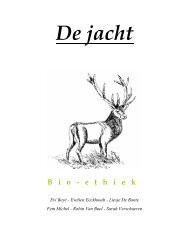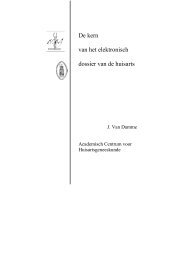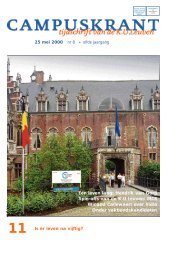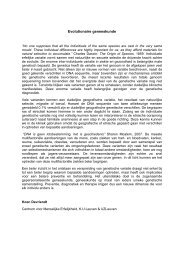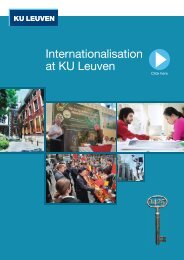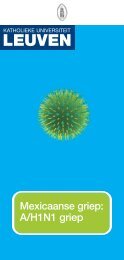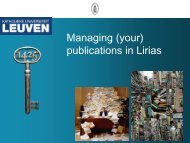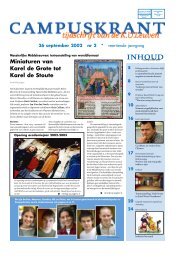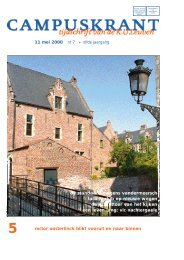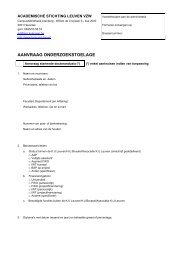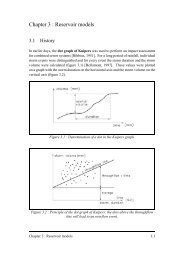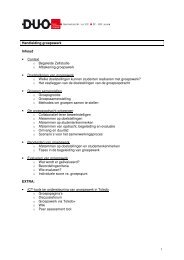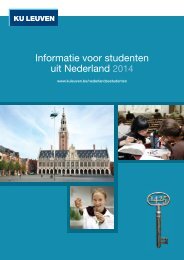Brochure (pdf) - KU Leuven
Brochure (pdf) - KU Leuven
Brochure (pdf) - KU Leuven
Create successful ePaper yourself
Turn your PDF publications into a flip-book with our unique Google optimized e-Paper software.
Education & Research<br />
for Development at the<br />
<strong>KU</strong> <strong>Leuven</strong> Association
Education & Research<br />
for Development at the<br />
<strong>KU</strong> <strong>Leuven</strong> Association<br />
The <strong>KU</strong> <strong>Leuven</strong> Association is an open and dynamic network<br />
linking university colleges across Flanders and Brussels with<br />
<strong>KU</strong> <strong>Leuven</strong> (University of <strong>Leuven</strong>). Together, they hold a prominent<br />
and influential position in Flemish and European higher education.<br />
The <strong>KU</strong> <strong>Leuven</strong> Association consists of a cluster of centres of<br />
excellence that offer high-quality education in nearly all academic<br />
disciplines and conduct cutting-edge fundamental and applied<br />
research in a wide range of domains. Its members strengthen<br />
each other by exchanging expertise and pooling resources,<br />
thus enhancing teaching and research excellence.<br />
The <strong>KU</strong> <strong>Leuven</strong> Association is dedicated to development cooperation in higher education. Putting our expertise<br />
to the service of society is an important aspect of our mission statement. Development cooperation is reciprocal.<br />
On the one hand, we help our international partners build capacity for education and research. On the other<br />
hand, development cooperation strengthens the quality of our own research and education because working<br />
in an international environment fosters innovation and creativity.<br />
Development cooperation in higher education extends<br />
far beyond engineering and medicine. Students,<br />
researchers and instructors from every field<br />
of study can benefit from and contribute<br />
to development cooperation.<br />
Professor Mark Waer, Rector of <strong>KU</strong> <strong>Leuven</strong><br />
Professor Bart De Moor, Vice Rector of International Policy<br />
Professor André Oosterlinck, Chairman of the <strong>KU</strong> <strong>Leuven</strong> Association
3<br />
This brochure provides information about our mission,<br />
our vision of development cooperation and the regions<br />
and domains in which we are currently active.<br />
High-quality education and research are important<br />
aspects of international development cooperation.<br />
Access to information and knowledge acquisition<br />
are crucial to socio-economic development.<br />
Universities and university colleges play a central role<br />
in this. They generate knowledge through research,<br />
transfer knowledge through education, and apply<br />
knowledge through public outreach. They stimulate<br />
critical thinking about society and have an important<br />
impact on policymaking.<br />
1.<br />
Mission<br />
To identify expertise and potential in research<br />
and education, and to deploy it for the benefit<br />
of development cooperation.<br />
2.<br />
Goals<br />
To integrate development cooperation as a crossdisciplinary<br />
theme in education, research and service<br />
to the community.<br />
Development cooperation is a driver of innovation<br />
in our own research and education activities.<br />
At the same time, research and education activities<br />
are oriented toward development. The <strong>KU</strong> <strong>Leuven</strong><br />
Association wants to break new ground in<br />
development cooperation in higher education<br />
through “Education & Research for Development”.<br />
3.<br />
Values<br />
Development cooperation at the <strong>KU</strong> <strong>Leuven</strong><br />
Association is based on international solidarity,<br />
mutual involvement, equality and respect for human<br />
dignity. We pursue quality, multidisciplinarity and<br />
sustainability.
4<br />
4.<br />
Activities<br />
We are active in education, research, capacity building, raising<br />
awareness, networking and fundraising. We pursue maximum<br />
synergy and complementarity with other donors and actors.<br />
5.<br />
Where?<br />
Most of our areas of activity are indicated on the map below.<br />
Visit our website for more information on the various projects<br />
in each country.<br />
COLOMBIA<br />
ECUADOR<br />
PERU<br />
MOROCCO<br />
CUBA<br />
SURINAME<br />
TOGO UGANDA ETHIOPIA<br />
CAMEROON<br />
KENYA<br />
D.R. CONGO BURUNDI RWANDA<br />
BOLIVIA<br />
TANZANIA<br />
ZIMBABWE<br />
MADAGASCAR<br />
SOUTH AFRICA<br />
BANGLADESH<br />
VIETNAM<br />
PHILIPPINES<br />
www.kuleuven.be/international/development_cooperation/index.html
Activity domains<br />
5<br />
1.<br />
Education<br />
Innovation through experience in the South and<br />
education innovation<br />
<strong>KU</strong> <strong>Leuven</strong> offers more than 70 international Master’s<br />
programmes in English. These programmes can<br />
be particularly useful for students from developing<br />
countries.<br />
<strong>KU</strong> <strong>Leuven</strong> and the university colleges of the <strong>KU</strong> <strong>Leuven</strong><br />
Association organise various courses and course units<br />
on development cooperation. We develop innovative<br />
courses and course units together with partner<br />
institutions.<br />
An experience abroad can be very enriching for both<br />
students and instructors. Writing a thesis or carrying<br />
out a traineeship in a developing country challenges<br />
students to develop their social skills and broaden<br />
their horizons. A short teaching assignment in the<br />
South provides knowledge and insight into a new<br />
context and stimulates innovation and creativity.<br />
MORE THAN AN ENGINEERING COURSE<br />
“I work at the Ministry of Public Works<br />
in Indonesia and was fortunate to learn<br />
of and then receive a scholarship for<br />
<strong>KU</strong> <strong>Leuven</strong>’s Master of Science in Water<br />
Resources Engineering. The programme<br />
covers everything people who work in<br />
water resources need to know. Although it<br />
is an engineering programme, we do not<br />
just learn technical things. I believe that a<br />
university education changes how people<br />
think for the better.”<br />
Erin Priandini, graduate student in the<br />
Water Resources Engineering Programme<br />
at <strong>KU</strong> <strong>Leuven</strong>
6<br />
SUPPORT FOR YOUNG PEOPLE HEADING SOUTH<br />
“The aim of ICoNS – a network on International<br />
Cooperation for North South Relations – is to support<br />
young people embarking on an adventure in the South.<br />
This network, which involves alumni, professionals in<br />
the field and partners from the South, takes support<br />
for young people to a higher level. An important<br />
aspect of ICoNS is our specific degree programme<br />
which combines preparation and guidance with an<br />
intensive stay in the South. We thus help students<br />
make the most of their experience so they can make<br />
a difference in their job in Flanders.”<br />
MEDIA AND LEARNING<br />
“If you look at the world around us, you see that<br />
tech nology is ubiquitous. We want to use that<br />
technology in a proper way to create an environment<br />
that stimulates people to learn, both here and in<br />
the South. The <strong>KU</strong> <strong>Leuven</strong> Media and Learning Unit<br />
provides services to the university with regard to<br />
new educational technologies and is also centre of<br />
expertise for the gathering and sharing of knowledge<br />
with students and instructors. Our motto is: ‘the world<br />
is one global classroom’. Our training courses for<br />
people from the South are enriching and inspiring<br />
not only for the participants, but also for our trainers.<br />
For us, capacity building is not just about providing<br />
tools and technologies, but also about focusing on<br />
people in their working and learning environments.<br />
In doing this, we are sharing good practices and<br />
enhancing the learning experience.”<br />
Jan Van Passel, programme director of IcoNS,<br />
Katholieke Hogeschool <strong>Leuven</strong><br />
Wim Van Petegem, Director Teaching and Learning<br />
Department, <strong>KU</strong> <strong>Leuven</strong>
7<br />
2.<br />
Research<br />
Working together towards a better world<br />
Insight into complex matters can lead to solutions to<br />
the fundamental problems faced by developing countries.<br />
At the same time, the confrontation with local conditions can<br />
be a source of innovation and creativity for applied research<br />
and can speed the development of fundamental knowledge.<br />
This creates a win-win situation that can lead to a long-term,<br />
result-oriented and research-based cooperation between<br />
researchers from the North and South.<br />
Qualitative development cooperation requires a solid theoretical<br />
framework. This helps to increase the impact of the cooperation.<br />
RESEARCH FOR POVERTY REDUCTION<br />
“Our research results can have a direct impact on<br />
development goals such as poverty reduction, food<br />
security and sustainable land use. In recent years,<br />
much research has been conducted on the impact<br />
of the globalisation of food chains in developing<br />
countries. This has taught us that the export of fruit<br />
and vegetables from Africa to Europe can effectively<br />
contribute to reducing poverty, especially through<br />
employment.”<br />
Miet Maertens, Professor at the Faculty of Bioscience<br />
Engineering, <strong>KU</strong> <strong>Leuven</strong><br />
WHY IS SEXUALITY TABOO?<br />
In Cuenca, as elsewhere in Latin America, sexuality is<br />
a taboo subject and the church is only beginning to<br />
embrace (at this point, abstinence-only) sex education.<br />
Five years ago, we had the opportunity to research<br />
the social and cultural factors related to the sexual<br />
health of adolescents. Ultimately, our studies and<br />
educational projects showed that sexuality is now a<br />
subject that can be discussed in a number of different<br />
contexts. Moreover, awareness about the importance<br />
of sex education has increased, as reflected in new<br />
social initiatives. Also, student mobility between Cuenca<br />
and Belgium has become a reality. Several students from<br />
Cuenca University have been offered the opportunity<br />
to study in Belgium. During their studies, they learn more<br />
about the process of scientific research andare given<br />
a framework and educational materials around which<br />
to build (sex) education. This provides a foundation<br />
for continuing their work back in Cuenca.”<br />
Monserrath Jerves, PhD student in medicine, University<br />
of Cuenca, Ecuador; Paul Enzlin, Professor at the Faculty<br />
of Medicine, <strong>KU</strong> <strong>Leuven</strong>
8<br />
3.<br />
Capacity building<br />
Sharing knowledge and expertise for the benefit of<br />
the South<br />
The <strong>KU</strong> <strong>Leuven</strong> Association is dedicated to strengthening<br />
the capacity of its partners in the South through development<br />
cooperation. The members of the association invest in higher<br />
education institutions and public services in the South.<br />
Together with local partners, they develop and support research<br />
and study programmes tailored to the needs of the region.<br />
Researchers, instructors and professionals in the South receive<br />
local support and can draw on the expertise and experience of<br />
the <strong>KU</strong> <strong>Leuven</strong> Association members. The <strong>KU</strong> <strong>Leuven</strong><br />
Association also provides practical institutional support.<br />
SUSTAINABLE COOPERATION<br />
“The townships in Bela Bela struggle with unemploy -<br />
ment, illiteracy and AIDS. This leads to medical, social<br />
and psychological problems. By sending students to<br />
Bela Bela each year, we are able to develop a better<br />
understanding of the local needs and create a<br />
sustainable cooperation. The students carry out<br />
traineeships there, develop a specific project and take<br />
part in community awareness activities. At the end of<br />
their stay, a needs analysis is conducted for project<br />
follow-up in consultation with local community leaders.<br />
The incoming group of students then picks up where<br />
the previous group left off.”<br />
Michaël Joris, Internationalisation Manager,<br />
Katholieke Hogeschool Limburg
9<br />
LUMOS<br />
“<strong>Leuven</strong> University Hospitals, the Biomedical Sciences<br />
Group of <strong>KU</strong> <strong>Leuven</strong> and the Department of Health<br />
and Technology of <strong>Leuven</strong> University College have<br />
joined forces for the coordination of their medical<br />
development cooperation activities, grouped under<br />
the name LUMOS. Staff members of the LUMOS<br />
partners volunteer their academic, clinical and<br />
management expertise to the LUMOS projects.<br />
These projects support the sustainable development<br />
of health care in developing countries through<br />
knowledge transfer and capacity building in an<br />
interactive cooperation.”<br />
Jan Verhaegen, Professor at the Faculty of Medicine,<br />
<strong>KU</strong> <strong>Leuven</strong> and President of the LUMOS Board of<br />
Governors<br />
TRAINING FOR MANAGING KNOWLEDGE<br />
INSTITUTIONS<br />
“The society and economy of the 21st century will be<br />
based on knowledge. This scarce and complex – but<br />
(re)producible – resource is developed and maintained<br />
by knowledge institutions. As with any human institution,<br />
these must be led and managed. Building on the<br />
experience of the members of the <strong>KU</strong> <strong>Leuven</strong> Association<br />
and other institutions of higher learning, we develop<br />
a management programme that addresses issues<br />
relevant for leading and managing universities and<br />
university colleges. It is geared toward those in<br />
charge of new institutions, or those tasked with<br />
reorienting and transforming existing schools into<br />
knowledge institutions. To facilitate access, the training<br />
programme utilises up-to-date communication and<br />
teaching technology. The focus is particularly on cases<br />
where conditions have not – or have hardly – permitted<br />
knowledge institutions to develop, that is, institutions<br />
whose ‘future has to be invented’. There are many such<br />
institutions in developing societies.”<br />
Piet Vanden Abeele, Professor emeritus at the Faculty of<br />
Business and Economics, former dean and vice rector,<br />
<strong>KU</strong> <strong>Leuven</strong>
10<br />
4.<br />
Raising awareness<br />
Supporting young people as citizens of the world<br />
An intercultural experience in development cooperation can<br />
be tremendously enriching for staff members and students,<br />
both personally and professionally. For those who do not<br />
travel abroad, various intercultural sensitisation activities<br />
are organised in Flanders.<br />
INTERCULTURAL LEARNING EXPERIENCE<br />
Empathy of the Belgian public towards poverty in the South (HIVA, 2012)<br />
EVALUATING SUPPORT FOR DEVELOPMENT<br />
“In comparison to other countries, Belgium devotes<br />
a lot of resources to strengthening support for<br />
development cooperation. Until recently, little was<br />
known about how this support was evolving over<br />
time. There was also limited knowledge about supply<br />
and demand of awareness raising activities and their<br />
impact. Since 2009, the PULSE Research Platform<br />
has conducted research to answer these questions.”<br />
Jan Van Ongevalle, PULSE Research Platform, Research<br />
Institute for Work and Society, <strong>KU</strong> <strong>Leuven</strong><br />
“The journey to Ghana taught me to work together<br />
with people from different cultures and to accept that<br />
those cultures are different and that you cannot<br />
transform people into copies of your own culture.<br />
The experience encouraged me to work much more<br />
independently. It was also a good way to learn how<br />
to deal with stressful and unforeseen situations.”<br />
Maxime Bolle, bioscience engineering student,<br />
<strong>KU</strong> <strong>Leuven</strong><br />
The travel grant programme helps to raise awareness about<br />
North/South issues among many hundreds of students. It is<br />
an increasingly popular programme that encourages students<br />
to write a thesis or carry out a traineeship in a developing country.
11<br />
“For our Bachelor’s project, we taught basic wound<br />
care skills to students and teachers at two primary<br />
schools in Uganda with the goal of helping to prevent<br />
wound complications. We managed to significantly<br />
improve the theoretical and practical knowledge<br />
of the students and teachers we interacted with.<br />
Their gratitude was unforgettable. Additionally, the<br />
project gave us the opportunity to develop our own<br />
competencies, including scientific literature research,<br />
organisation, teaching, and group coaching. By ensuring<br />
that the students and teachers received training, we were<br />
able to secure the continuation of the project. They can<br />
now pass the knowledge on to a larger audience.”<br />
Aaron Maes, Alexander Dael, Koen Demeulemeester<br />
and Klaas Calmeyn, undergraduate nursing students,<br />
Katholieke Hogeschool Zuid-West-Vlaanderen
12<br />
5.<br />
Networking<br />
Sharing knowledge with and for local communities<br />
Building networks in the North and South is crucial to developing<br />
and sharing knowledge, expertise and innovation. The spread<br />
of research results within local communities is a priority.<br />
The <strong>KU</strong> <strong>Leuven</strong> Association encourages partnerships with<br />
researchers from the South, for instance through co-publications.<br />
Other actors, such as businesses and international organisations,<br />
can also play an important role in the dissemination of knowledge.<br />
Businesses active in the South have a great need for local<br />
expertise.<br />
WATER CONFERENCE<br />
“The third conference within the framework of the<br />
institutional cooperation programme with the Mekelle<br />
University – ‘Water 2011: Integrated water resources<br />
management in tropical and subtropical drylands’ – was<br />
held in Ethiopia in September 2011. The conference<br />
was attended by many large international organisations,<br />
including the UN Food and Agriculture Organisation<br />
and major international research organisations, which<br />
constituted an important added value. By keeping<br />
the participation fees low, we were able to bring a<br />
large number of top African scientists to the table,<br />
enabling them to network with their international<br />
colleagues.”<br />
Seppe Deckers, Professor at the Faculty of Bioscience<br />
Engineering, <strong>KU</strong> <strong>Leuven</strong>
13<br />
OUR MOTIVATION<br />
“The rationale for participating in university development<br />
cooperation as an academic is simple: universities<br />
emanate the belief that development originates in<br />
research: research for development – R4D – is the<br />
central paradigm of any university. This holds for both<br />
the North and the South. Hence, as an academic,<br />
one must focus one’s research where a real difference<br />
can be made. This attitude is transferred every day<br />
to students, fostering the necessary awareness and<br />
social responsibility which should be expected from<br />
future leaders in a globalised world.”<br />
Roel Merckx, Professor at the Faculty of Bioscience<br />
Engineering, <strong>KU</strong> <strong>Leuven</strong><br />
“Our professional Bachelor’s programmes combine<br />
competence-based education and practice-oriented<br />
research. They focus on finding innovative solutions<br />
for society’s concrete challenges – and this includes<br />
challenges faced by developing countries.<br />
Participation in development projects adds to the<br />
quality and relevance of our educational programmes:<br />
it challenges teachers and students to apply their<br />
professional knowledge and skills in new environments,<br />
to take up their responsibility as citizens of a global<br />
world, and to broaden their personal and professional<br />
horizons. Innovative thinking, flexibility and responsibility<br />
are all indispensable competences for a professional<br />
in today’s world.”<br />
Piet De Leersnyder, President of the Professional Higher<br />
Education Committee of the <strong>KU</strong> <strong>Leuven</strong> Association
14<br />
The Development Cooperation Unit of <strong>KU</strong> <strong>Leuven</strong>’s<br />
International Office functions as the <strong>KU</strong> <strong>Leuven</strong> Association’s<br />
contact, advice and expertise centre for development<br />
cooperation within the <strong>KU</strong> <strong>Leuven</strong> Association.<br />
Contact:<br />
Martine Dekoninck<br />
International Office<br />
Development Cooperation Unit<br />
Naamsestraat 63, box 5001<br />
B-3000 LEUVEN<br />
martine.dekoninck@int.kuleuven.be<br />
+32 16 32 40 17<br />
www.kuleuven.be/international/development_cooperation/<br />
Our primary financing channel at the moment is VLIR-UOS,<br />
the umbrella organisation responsible for university develop -<br />
ment cooperation in Flanders. <strong>KU</strong> <strong>Leuven</strong> also allocates<br />
1.3 million euro for grants, scholarships and small-scale<br />
initiatives through the Interfaculty Council for Development<br />
Cooperation.<br />
Additional resources will help us to increase the impact of<br />
our projects and develop new initiatives for the benefit of<br />
communities in the South. Please contact the Development<br />
Cooperation Unit for more information on how you can<br />
support our projects.
Associatie <strong>KU</strong> <strong>Leuven</strong><br />
Schapenstraat 34 bus 5600<br />
BE-3000 LEUVEN, België<br />
tel. + 32 16 32 40 84<br />
fax + 32 16 32 40 88<br />
info@associatie.kuleuven.be<br />
www.associatie.kuleuven.be<br />
Hogeschool-Universiteit Brussel<br />
Warmoesberg 26<br />
BE 1000 BRUSSEL<br />
tel. + 32 2 221 12 11<br />
info@hubrussel.be<br />
www.hubrussel.be<br />
Groep T – Internationale<br />
Hogeschool <strong>Leuven</strong><br />
Vesaliusstraat 13<br />
BE 3000 LEUVEN<br />
tel. + 32 16 30 10 30<br />
fax + 32 16 30 10 40<br />
groept@groept.be<br />
www.groept.be<br />
Katholieke Hogeschool<br />
Brugge-Oostende<br />
Xaverianenstraat 10<br />
BE 8200 BRUGGE<br />
tel. + 32 50 47 18 00<br />
fax + 32 50 47 18 10<br />
info@khbo.be<br />
www.khbo.be<br />
Katholieke Hogeschool Kempen<br />
Kleinhoefstraat 4<br />
BE 2440 GEEL<br />
tel. + 32 14 56 23 10<br />
fax + 32 14 58 48 59<br />
info@khk.be<br />
www.khk.be<br />
Katholieke Hogeschool <strong>Leuven</strong><br />
Abdij van Park 9<br />
BE 3001 LEUVEN<br />
tel. + 32 16 39 86 60<br />
fax + 32 16 39 86 66<br />
info@khleuven.be<br />
www.khleuven.be<br />
Katholieke Hogeschool Limburg<br />
Universitaire Campus gebouw B bus 1<br />
BE 3590 DIEPENBEEK<br />
tel. + 32 11 23 07 70<br />
fax + 32 11 23 07 89<br />
informatie@khlim.be<br />
www.khlim.be<br />
Katholieke Hogeschool Sint-Lieven<br />
Gebr. Desmetstraat 1<br />
BE 9000 GENT<br />
tel. + 32 9 265 86 10<br />
fax + 32 9 265 86 40<br />
info@kahosl.be<br />
www.kahosl.be<br />
Katholieke Hogeschool Zuid-West-<br />
Vlaanderen<br />
Doorniksesteenweg 145<br />
BE 8500 KORTRIJK<br />
tel. + 32 56 26 41 60<br />
fax + 32 56 26 41 75<br />
info@katho.be<br />
www.katho.be<br />
Lessius Antwerpen<br />
Jozef De Bomstraat 11<br />
BE 2018 ANTWERPEN<br />
tel. + 32 3 206 04 80<br />
fax + 32 3 206 04 81<br />
info@lessius.eu<br />
www.lessius.eu<br />
Lessius Mechelen<br />
Zandpoortvest 13<br />
BE 2800 MECHELEN<br />
tel. + 32 15 36 91 00<br />
fax + 32 15 36 91 09<br />
info@mechelen.lessius.be<br />
www.mechelen.lessius.be<br />
LUCA School of Arts<br />
Koningsstraat 328<br />
BE 1030 Brussel<br />
tel. +32 2 250 15 11<br />
fax. +32 2 218 58 39<br />
info@luca-arts.be<br />
www.luca-arts.be<br />
<strong>KU</strong> <strong>Leuven</strong><br />
Oude Markt 13<br />
BE 3000 LEUVEN<br />
tel. + 32 16 32 40 10<br />
fax + 32 16 32 40 14<br />
info@kuleuven.be<br />
www.kuleuven.be<br />
www.associatie.kuleuven.be


